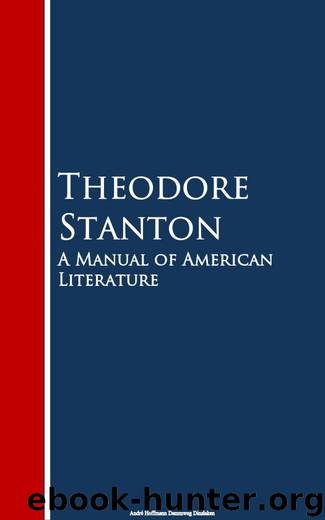A Manual of American Literature by Theodore Stanton

Author:Theodore Stanton [Stanton, Theodore]
Language: eng
Format: epub
Published: 2016-09-06T22:00:00+00:00
... feelings of calm power and mighty sweep,
Like currents journeying through the boundless deep.
He was a devoted lover of humanity and life; he was a devoted lover of his art. For him, art and life were one. It is easy for the uninitiated to credit him with a lack of warmth. The fully emancipated are aware what union of fire and self-restraint, of vigour and delicacy, goes to the rearing of a fabric like the orderly and effective career of Bryant.
Like most, or all, great poets, Bryant wrote admirable prose. His essays in criticism have already been alluded to. As a stylist he was indefatigably painstaking even to the smallest detail: “He was not a fluent nor a very prolific writer.... His manuscripts, as well as his proofs, were commonly so disfigured by corrections as to be read with difficulty even by those familiar with his script.” His capacity for intense application was a partial measure of his success both as poet and as critic. For oratory, his legal training stood him in good stead, and his later prominence in New York and in the country as a whole gave him many an occasion. If Bryant, as Matthew Arnold believed, was “ facile princeps ” among American poets, this eminence arose from no merely capricious outburst of genius; it was the natural efflux of a noble, well rounded, and representative human life.
Saxe, Melville, Alice and Phoebe Cary.— After Bryant it is convenient to speak of a few poets, very different from him, and for the most part from each other, whose contemporaneous presence in New York is almost the only thing that connects them. John G. Saxe (1816–87), a native of Vermont, in his time was counted a leader among satirists. He staggers now under the accusation of extreme superficiality; none the less is he lively and readable. He consciously imitated Hood; he could scarcely avoid imitating Wendell Holmes. Of himself he had a remarkable turn for epigram and for punning in rhyme. His burlesque adaptations of Ovid are smart and amusing. On the whole it may be said that Saxe was at his best in “The Proud Miss MacBride,” where he girds at an upstart aristocracy:
Of all the notable things on earth,
The queerest one is pride of birth,
Among our “fierce Democracie.”
Herman Melville (1819–91), who wrote a fascinating account (“Typee,” 1846) of his stay among the aborigines of the Marquesas, also published “Battle-Pieces” (1866) and other poems. His verse is less objective and sincere than his prose. Alice Cary (1820–71) and her sister, Phoebe (1824–71), were born in Ohio, where they were locally appreciated. Removing first to Philadelphia, then to New York, they supported themselves by their pens. The talents of Alice Cary were manifestly superior; yet for a time, yielding to her admiration of Poe, she allowed the element of harmonious sound in her poetry to overbalance that of meaning. Her hymns, one of which is almost a classic, are noble in their purity of sentiment.
Dana, Sprague, Hillhouse, etc.
Download
This site does not store any files on its server. We only index and link to content provided by other sites. Please contact the content providers to delete copyright contents if any and email us, we'll remove relevant links or contents immediately.
| Africa | Americas |
| Arctic & Antarctica | Asia |
| Australia & Oceania | Europe |
| Middle East | Russia |
| United States | World |
| Ancient Civilizations | Military |
| Historical Study & Educational Resources |
Cat's cradle by Kurt Vonnegut(15333)
Pimp by Iceberg Slim(14484)
4 3 2 1: A Novel by Paul Auster(12372)
Underground: A Human History of the Worlds Beneath Our Feet by Will Hunt(12085)
The Radium Girls by Kate Moore(12017)
Wiseguy by Nicholas Pileggi(5769)
The Fire Next Time by James Baldwin(5431)
Perfect Rhythm by Jae(5396)
American History Stories, Volume III (Yesterday's Classics) by Pratt Mara L(5298)
Paper Towns by Green John(5177)
Pale Blue Dot by Carl Sagan(4996)
A Higher Loyalty: Truth, Lies, and Leadership by James Comey(4951)
The Mayflower and the Pilgrims' New World by Nathaniel Philbrick(4487)
The Doomsday Machine by Daniel Ellsberg(4484)
Killers of the Flower Moon: The Osage Murders and the Birth of the FBI by David Grann(4435)
The Sympathizer by Viet Thanh Nguyen(4384)
Too Much and Not the Mood by Durga Chew-Bose(4337)
The Borden Murders by Sarah Miller(4312)
Sticky Fingers by Joe Hagan(4188)
